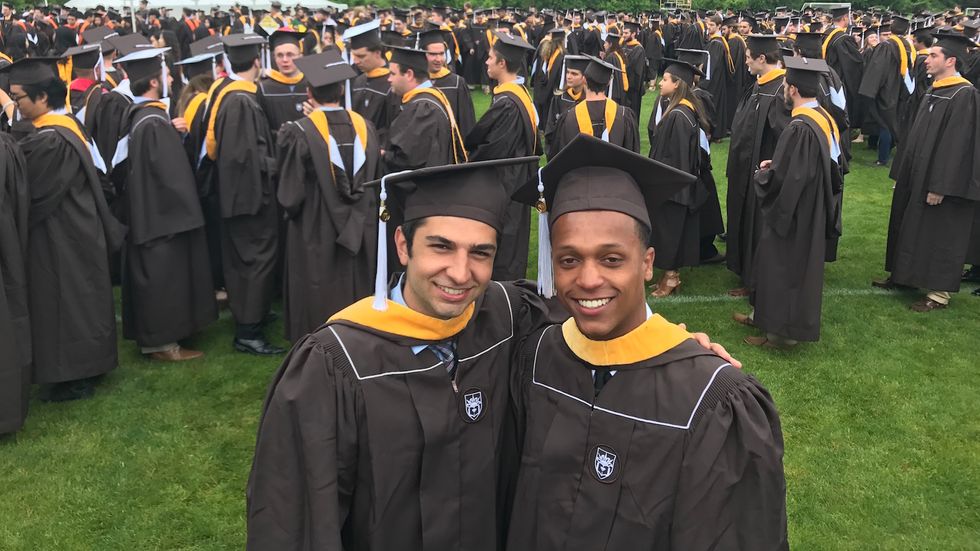"Andrew, don't let this get you down, you deserve to be on the team," my Dad calmly explained to me on why I was cut from my third-grade basketball team. "It's all about who you know — it's called POLITICS," he continued to explain to me. I was mad and wasn't sure I knew what he meant but I knew that whenever I heard the word "politics" from that point on I would get upset.
Throughout the rest of my time in grammar school, my teachers programmed me to believe that America was the greatest country on Earth. They told me that everyone was treated fairly and that everyone had an equal opportunity to make it if they tried. They would speak about American presidents such as George Washington, Abraham Lincoln, and Theodore Roosevelt like they never committed a sin. I believed that Christopher Columbus was the greatest explorer to ever live and he was Italian too, just like me! Amazed by how lucky I was to be American, I would ask my mom why America was so powerful, and she would tell me it was because of the army's bravery. This answer satisfied me for a while until I asked why our army was so brave? She told me because they volunteered, which meant that they wanted to defend our country. This answer was enough for me to believe that the United States was the greatest and most powerful country in the world- nobody could tell me otherwise.
I went to high school armed with great confidence in my country until I started to connect more with my teachers. On my lunch breaks, l would go into my teacher's office to learn more about politics and American history. In one of the conversations with my teacher, I brought up the 1923 Supreme Court case Buck vs. Bell that we learned in class. He recommended a book for me to read by Edwin Black called "War Against the Weak: Eugenics and America's Campaign to Create a Master Race," in which I learned that Hitler took his genocidal ideas from American scientists from the John D. Rockefeller Institute in Long Island. I learned about how the Supreme Court passed a law giving states the ability to sterilize whoever they deemed "feeble-minded" and how "patients" would go to the doctors for "checkups" and then later in life wonder why they could not have kids. My proud patriotic mind couldn't believe that America was legally creating a master race. The only difference between Hitler and these American scientists were that Hitler figured out how to sterilize large groups of people with gas chambers. American scientists only individually sterilized the "feeble-minded." Yet still naive Americans are taught that Hitler is the devil and the Americans are angels.
However, I was no longer "most Americans," so I built this narrative in my head that America abused their power. I started to question the legacy of my greatest heroes and looked at their situation more maturely. Sure, I still thought George Washington was a great leader but I also discovered that he owned plantations that were harvested by slaves. Christopher Columbus discovered America but how many native Americans did he rape and kill to claim this land? With this knowledge, I would argue so much with my high school peers that I soon grew tired of talking about politics. I came to the conclusion that I no longer wanted anything to do with politics because it would only lead to arguments and hard feelings between friends, so I just kept this information to myself.
When I left for college I had every intention to move on to a finance career and leave politics in the dust; however, my friends and my writing prevented that from happening. I gravitated towards the people in my freshman hall who had different opinions than me. For the first time, I was discussing politics with people who my Uncle Tommy complained that he wasted his tax dollars on. A few brave souls would join in the conversation while others would flee so that they could avoid getting hit with any scrap. Although these debates seemed like war zones at times, I learned about the political structures and institutions that have prevented minorities from succeeding in America. These conversations taught me about mass incarceration, the prison pipeline, and the war on drugs, which all shattered my belief that everyone has an equal chance of success in America.
As I graduate college I am thankful for all of the truths that my education has revealed to me. I go into the real world knowing that American history is not always as clear-cut as textbooks would make us believe. America has its baggage, which seems obvious to marginalized groups of people but it was not clear to me as a child. However, even with this history I still believe America is the greatest place on Earth, but it is not as simple as my grammar school teachers made it out to be; we still have a long way to go.
The simple definition of politics that my Dad gave to me in third-grade was true, but politics extends beyond a privileged white kid getting cut from his third game basketball team. American politics has caused African-Americans to be shackled in chains, women to be denied inalienable rights like voting, and "feeble-minded" people to be legally sterilized. It is now my responsibility to spread this information that I have learned, so that we progress towards a country that serves all of the people, not just the few. I wish I could say that my most valuable lesson I learned throughout my education was a magic formula that solved all of the world's problems but it was not. In fact, these lessons on politics have been the most valuable lessons that I have learned, which have opened my eyes to the world we live in, I hope they can open your mind too.
















